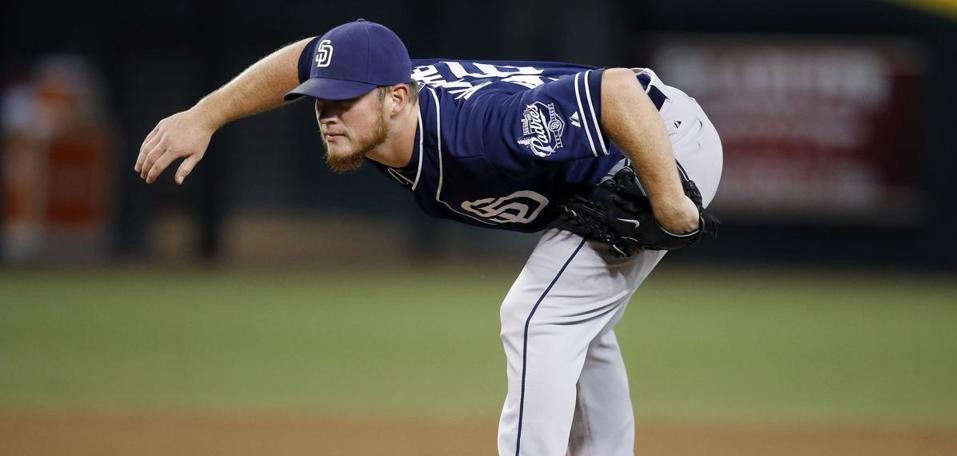Last Friday, the Boston Red Sox traded four prospects to the San Diego Padres for closer Craig Kimbrel. The Sox will now control one of the game’s most electric pitchers, through the 2018 season. This trade is the most notable offseason move so far, and signifies the Red Sox’ intent to give up prospects and money to return to the top of the American League East after finishing last in three of the last four seasons. Koji Uehara, who was a huge factor in Boston’s 2013 World Series victory, is now forty, and was injured at the end of the 2015 season. The Red Sox rightly realize that an effective closer is necessary for any team desiring playoff contention, and they went and traded for the game’s most consistent closing pitcher over the past few years. I believe that this is a huge win for the Red Sox, because Kimbrel is, at age twenty-seven, already building his case for being one of the greatest closers in baseball history.
Kimbrel is coming off a solid season in San Diego after being traded by the Atlanta Braves in early April. Kimbrel posted a 2.58 ERA and recorded 39 saves—shockingly, both are career lows (excluding 2010, his debut season, when he was not in a closing role). Kimbrel has a career 1.63 ERA, and has 225 career saves. From 2011-2014, Kimbrel was seen as the game’s most effective closer. He led the National League in saves and was an all-star each year. In 2011, Kimbrel was the National League Rookie of the Year after setting a National League record for saves by a rookie with 46, and also went 38 and 1/3 innings without allowing a run, the longest such streak that season.
In 2012, Kimbrel put on a show of sheer dominance—he converted 42 of 45 save opportunities, and he became the first pitcher in Major League history to strike out at least half of the hitters he faced. His final ERA was 1.01, and he had a WHIP of 0.65 to pair with a batting average against of .126. Kimbrel finished fifth for the National League Cy Young award, and eighth for the National League MVP award—truly impressive feats for a relief pitcher. In 2013, Kimbrel became the second-youngest pitcher to reach 100 career saves, and he became the eleventh pitcher to reach 50 saves in one season. In 2014, Kimbrel became the quickest pitcher to reach 400 strikeouts (in just 236 innings), and became the third player to record 40 saves in three consecutive seasons (in just his first three full seasons). With the Padres in 2015, Kimbrel reached 200 saves—the fastest pitcher to reach that mark, doing so in just 318 games.
Mariano Rivera’s retirement two seasons ago led many to think that they would never witness such greatness from a closing pitcher again. But Kimbrel has been just as good, if not better, than the great Rivera when their first five full seasons are pitted side-by-side. From 1996-2000, Rivera posted a 2.11 ERA and compiled 165 saves. From 2011-2015, Kimbrel posted a 1.70 ERA and compiled 224 saves. Based on the numbers alone, Kimbrel has been a more effective closer. However, it should be acknowledged that in the late 1990s, offense reigned over pitching. Rivera posted impressive numbers that, in the midst of the steroid era, were untouchable. We cannot know how Kimbrel would have performed had his first few seasons been in this time period. In addition, Rivera excelled in the postseason, helping his team to four World Series championships in his first five seasons. On the other hand, Craig Kimbrel has only appeared in six postseason games, and only has one postseason save. A significant part of Mariano Rivera’s legacy rests on that fact that he was a pivotal player on one of the greatest teams in Major League history.
Craig Kimbrel has not been on any dominant teams, but he does have an intimidating presence that is similar to Rivera’s. His hard fastball, occasionally reaching 100 miles per hour, his 87 mile per hour curveball, and his unique pre-pitch stance and stare are trademarks, just as Rivera’s hard bat-shattering slider and similarly unique pre-pitch posture came to define him. On a dominant team, Kimbrel would be a truly frightening presence for opposing batters. Kimbrel is technically on pace to surpass Rivera’s all-time saves record of 652, albeit in eleven years. Kimbrel will be thirty-eight then, and it is hard to tell whether he can remain dominant and injury-free for that long. In any case, it is worth noting that Craig Kimbrel is a pitcher worth watching over the coming years. Perhaps after an off-year with the Padres, Kimbrel will reestablish his legacy with the Red Sox in 2016.






